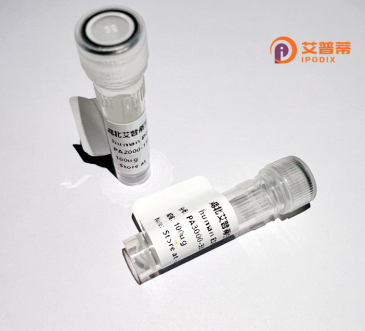
| 纯度 | >90%SDS-PAGE. |
| 种属 | Human |
| 靶点 | APOBEC3D |
| Uniprot No | Q96AK3 |
| 内毒素 | < 0.01EU/μg |
| 表达宿主 | E.coli |
| 表达区间 | 1-386aa |
| 氨基酸序列 | MNPQIRNPME RMYRDTFYDN FENEPILYGR SYTWLCYEVK IKRGRSNLLW DTGVFRGPVL PKRQSNHRQE VYFRFENHAE MCFLSWFCGN RLPANRRFQI TWFVSWNPCL PCVVKVTKFL AEHPNVTLTI SAARLYYYRD RDWRWVLLRL HKAGARVKIM DYEDFAYCWE NFVCNEGQPF MPWYKFDDNY ASLHRTLKEI LRNPMEAMYP HIFYFHFKNL LKACGRNESW LCFTMEVTKH HSAVFRKRGV FRNQVDPETH CHAERCFLSW FCDDILSPNT NYEVTWYTSW SPCPECAGEV AEFLARHSNV NLTIFTARLC YFWDTDYQEG LCSLSQEGAS VKIMGYKDFV SCWKNFVYSD DEPFKPWKGL QTNFRLLKRR LREILQ |
| 分子量 | 46.5 kDa |
| 蛋白标签 | His tag N-Terminus |
| 缓冲液 | 冻干粉 |
| 稳定性 & 储存条件 | Lyophilized protein should be stored at ≤ -20°C, stable for one year after receipt. Reconstituted protein solution can be stored at 2-8°C for 2-7 days. Aliquots of reconstituted samples are stable at ≤ -20°C for 3 months. |
| 复溶 | Always centrifuge tubes before opening.Do not mix by vortex or pipetting. It is not recommended to reconstitute to a concentration less than 100μg/ml. Dissolve the lyophilized protein in distilled water. Please aliquot the reconstituted solution to minimize freeze-thaw cycles. |
以下是关于 **APOBEC3D** 的3篇代表性文献及其摘要内容的简要整理:
---
1. **文献名称**:*APOBEC3D drives HIV-1 drug resistance through viral mutagenesis in patients*
**作者**:Bohn et al.
**摘要**:研究发现,APOBEC3D通过诱导HIV-1基因组中的胞嘧啶脱氨突变(C-to-U),促进病毒耐药性的产生。其在患者体内与APOBEC3F协同作用,加速病毒逃逸抗逆转录病毒治疗的进程。
---
2. **文献名称**:*Structure and antiviral activity of the human APOBEC3D enzyme*
**作者**:Kouno et al.
**摘要**:通过晶体结构解析,揭示了APOBEC3D的锌结合结构域和底物识别机制,证明其能抑制HIV-1复制,但活性弱于APOBEC3G/3F,可能与病毒蛋白Vif的互作特异性有关。
---
3. **文献名称**:*APOBEC3D promotes RNA virus adaptation and antiviral immunity*
**作者**:Sharma et al.
**摘要**:发现APOBEC3D不仅限制RNA病毒(如流感病毒和冠状病毒)的复制,还通过诱导病毒突变促进宿主免疫系统识别新抗原,揭示了其在先天免疫与病毒进化中的双重作用。
---
4. **文献名称**:*APOBEC3D genetic variation and association with cancer mutagenesis*
**作者**:Law et al.
**摘要**:通过癌症基因组数据分析,发现APOBEC3D在部分肿瘤中高表达,其活性特征与特定突变谱(如TCW位点突变)相关,提示其可能作为潜在的癌症治疗靶点。
---
如需具体文献原文,可进一步通过PubMed或DOI查询。
APOBEC3D (A3D) is a member of the APOBEC (apolipoprotein B mRNA-editing enzyme catalytic polypeptide-like) family of cytidine deaminases, which play roles in innate immunity and RNA/DNA editing. These enzymes are crucial in defending against viral infections by introducing mutations into viral genomes through cytosine-to-uracil deamination, a process particularly effective against retroviruses and retrotransposons. A3D, located on human chromosome 22. shares structural features with other APOBEC3 proteins, including zinc-dependent catalytic domains. However, its activity appears weaker compared to homologs like APOBEC3G (A3G) or APOBEC3F (A3F), potentially due to regulatory mechanisms balancing antiviral defense and host genome protection.
Research highlights A3D’s role in restricting HIV-1 replication, often synergizing with other APOBEC3 proteins to induce viral hypermutation. Its activity is counteracted by the HIV-1 virion infectivity factor (Vif), which targets A3D for degradation. Beyond antiviral functions, A3D has been implicated in cancer mutagenesis, contributing to clustered genomic mutations (e.g., kataegis) observed in tumors. This dual role—both protective and potentially pathogenic—underscores its biological complexity. Recent studies focus on understanding its regulation, interaction with viral and cellular proteins, and context-dependent activation, aiming to harness its antiviral potential while mitigating oncogenic risks. A3D remains a compelling target for therapeutic strategies against viral infections and cancer.
×